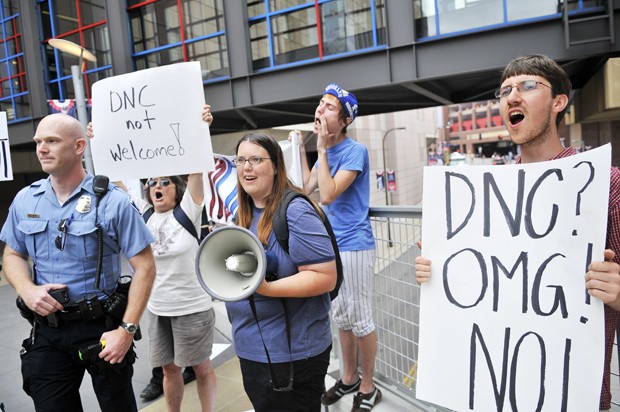The Democratic National Convention selection committee is scoping out Minneapolis this week as a potential host for its 2012 convention, but city and party officials are tight-lipped about the details of the visit.
The committee will likely visit area hotels and possible sites for convention events, in addition to checking out traffic options and public transit.
Minneapolis Mayor R.T. Rybak suggested the Metrodome as the main site for the convention because its location allows for easier traffic access and less disruption downtown, although the committee will make the final decision.
The low-key visit and little detail about the selection process was in response to requests from the committee, said Kristen Montag, spokeswoman for the city’s marketing group Meet Minneapolis, which is handling the bid for the convention.
“It’s just a part of the process that they require, and we want to honor that,” she said.
City officials also don’t want to reveal details to the other three finalists in the running, as it’s still a competition, Jeremy Hanson Willis, Rybak’s chief of staff, said.
While the city and committee are keeping quiet, protesters yelled in the streets last Sunday to send the message that they don’t want another political convention in the Twin Cities.
The small group of about 20 protesters cited both ideological disagreements with the party and concerns about excessive security as reasons to keep the DNC out of Minneapolis.
“We’re still trying to recover from the 2008 RNC,” Dave Bicking, a south Minneapolis resident and protester, said. “There are still trails that haven’t been wrapped up yet, and it will be the same if the DNC comes to Minneapolis.”
Although Rybak and other officials have said Minneapolis can learn from St. Paul’s experience with the 2008 Republican National Convention, all they’ve learned is to be better riot police, contended Melissa Hill, protester and 2009 Ward 3 City Council candidate.
“They keep saying they will change the way they handle security, but the structure really doesn’t allow for change,” said Hill, who was arrested during the 2008 RNC after the Rage Against the Machine concert. “It becomes a national security event when something like this comes to town, and the city doesn’t really have much say.”
The small group of about 20 protesters walked from the Warehouse District/Hennepin Avenue light-rail station to outside of Target Field carrying homemade signs and handing out flyers before Sunday’s Twins game.
Many protesters were involved with a group called NoDNC, which has organized a website and Facebook page promoting their cause. The group has also held public meetings and has another scheduled for July 27.
Minneapolis officials argue that the economic benefit is enough reason to promote the DNC in Minneapolis.
The 2008 RNC generated more than $170 million for St. Paul, according to a study by Dave Brennan, co-director of the Institute for Retailing Excellence at the University of St. Thomas.
Still, opponents say economic gain is not enough.
“They’re giving up our liberties to sell hotel rooms,” Bicking said.
The committee hasn’t released a schedule of its visits, but Minneapolis appears to be the first.
Committee officials have said they will make their decision by the end of the year, Montag said.
“Obviously we hope it will happen sooner than later, but that’s what we know right now,” she said.
Meet Minneapolis submitted its bid for the 2012 DNC on May 21, the last day cities could apply.
The committee announced at the beginning of the month that Minneapolis was a finalist for the convention, along with Cleveland, St. Louis and Charlotte, N.C.
The 2012 DNC is scheduled to begin Sept. 3, 2012, one week after the Republican convention in Tampa, Fla.
Minneapolis’ experience helping with and witnessing the 2008 RNC is a selling point for the city, Montag said.
“We think we are the best choice for many reasons,” she said, “but experience tops the list.”








